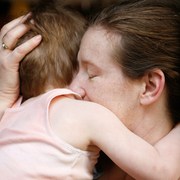 Steve Lovegrove/PhotoSpin
Steve Lovegrove/PhotoSpin
Many of us as adults have had to deal with the death of a loved one. Perhaps some of us were children when we experienced the loss of a close family member or parent.
Unfortunately, these experiences don’t make it automatically easier to explain death to a child.
How do you tell a child about the loved one’s death? What does a child know or understand about death?
Should a child attend a funeral? Are there things you should or shouldn’t do? These questions are all addressed below.
Basic Coping with Grief Need-to-Knows
Surviving parents and caregivers involved in the family grieving process need to understand that each child processes death differently depending on their age and experience. It’s important that people involved in the support system know how to speak — and listen — to the child. (3)
With infants and toddlers, obviously, explaining is not possible. They will sense the feelings and moods of those around them, and definitely notice the absence of the parent. (1, 3)
Since infants and toddlers will not understand words, it is important to maintain a strong physical connection with them so they feel secure, loved and cared for.
Preschoolers may understand the basic concept of death, but don’t yet understand the concept of the finality of death.
“[K]ids in this age bracket often see things in terms of fantasy or magic, they tend to see the separation as temporary and genuinely believe that the person can be brought back from death if only they wish hard enough.” (3)
Tips for Helping Young Children Cope with Death
1) Be honest with kids and encourage questions.
Children deserve the truth about the changes that have happened in their lives, and “it’s important to create an atmosphere of comfort and openness, and send the message that there’s no one right or wrong way to feel.” (4)
Additionally, children should feeling comfortable coming to you and other support people with any questions they might have. Again, answer honestly. If you’re unsure of the answer, tell them.
Children “will respect the fact that you’re honest enough to admit…that you can’t always answer the questions that they pose.” (3)
2) Explain the death in basic and concrete terms.
You might say, for instance, that "dying" or "dead" means that the body stopped working, or explain the life cycle to them. Through the latter, hopefully the child will understand that death is a natural and normal part of life, but it will also help them to not feel alone. They may realize that others have experienced the pain too. (3, 4)
Don’t try to shield or protect them by using phrases like “went away” or “went to sleep” or “we lost so-and-so today”. "Young children think so literally, such phrases may result in them being afraid to go to sleep or fearful whenever someone goes away.” (4)
3) Be patient.
As mentioned already, young children may not understand that death means that mom or dad is not coming back. “So even after you’ve explained this, kids may continue to ask where the loved one is or when the person is returning. As frustrating as this can be, continue to calmly reiterate that the person has died and can’t come back.” (4)
4) Practice effective listening.
Be aware that the questions children ask are much more basic than we think. If a five-year-old asks where the loved one is, he’s not necessarily asking about the existence of an afterlife. The answer he’s looking for might be much simpler, like, “So-and-so’s at the cemetery.” (4)
Part of effective listening is not reacting or responding to the child’s feelings with words like, “You shouldn’t feel that way” or “Don’t cry.” Children need to know that their feelings are normal and a reasonable reaction to what has happened, and that you and other caregivers understand this.
5) Give them a chance to say good-bye.
Whether it’s attending the funeral or a private service at home, children need closure just as much as adults.
“Children as young as two and a half understand the idea of saying goodbye ... After the funeral, children may, in play, reenact the funeral and/or pretend to be sick or dying. This playing out of the illness and the funeral is quite normal.” (1)
Sources:
1. Hospice: When a Parent Dies A Guide for Patients and their Families. Cancer Society of New Zealand. Web. Mar 18, 2013.
http://www.hospicenet.org/html/parent.html
2. Helping Your Child Deal with the Death of a Parent. FamilyEducation.com. Web. Mar 18, 2013.
http://life.familyeducation.com/death-and-dying/toddler/53891.html
3. Death of a Parent – Saying Good-Bye to Mommy or Daddy. Dawson, Diana. ElderCare Online. Web. Mar 18, 2013.
http://www.ec-online.net/Library/grief-loss/parent.html
4. Helping Your Child Deal with Death. KidsHealth.org. Web. Mar 18, 2013.
http://kidshealth.org/parent/emotions/feelings/death.html
Reviewed March 19, 2013
by Michele Blacksberg RN
Edited by Jody Smith






Add a CommentComments
There are no comments yet. Be the first one and get the conversation started!